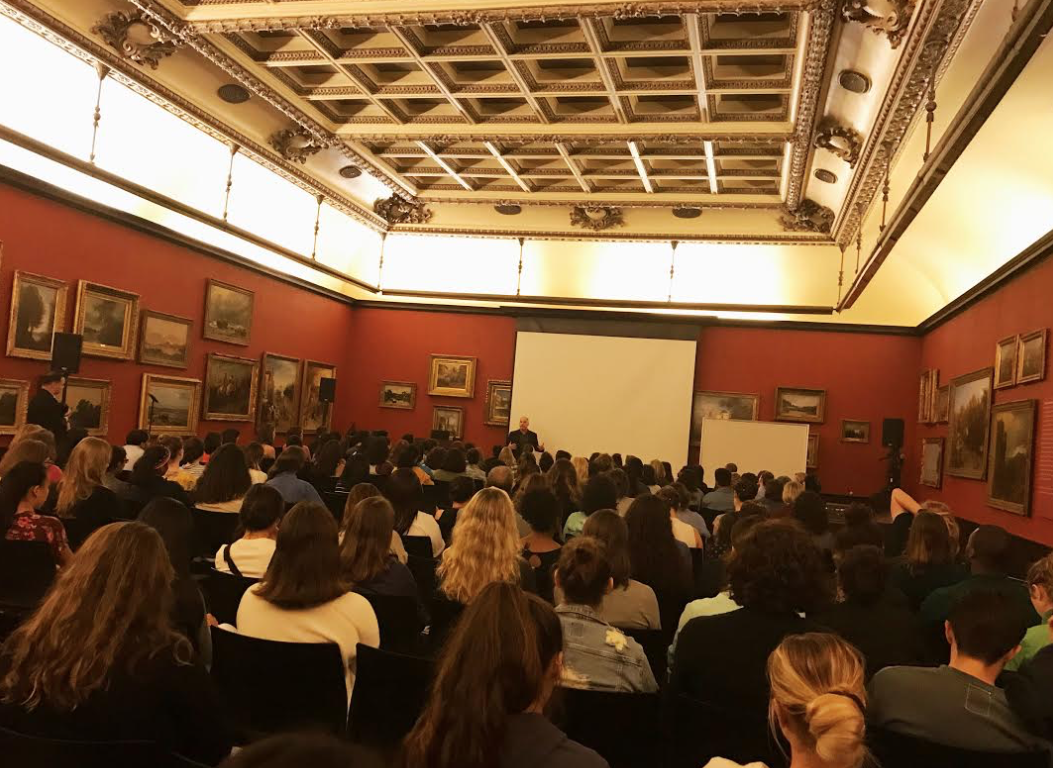
Educator and cultural theorist Jackson Katz spoke to a full crowd at Drexel University Oct. 10 in the A.J. Drexel Picture Gallery about gender-based violence and what we can do as a society to improve prevention efforts in a public talk titled “Gender Based Violence: Who’s at Fault”.
Among the many topics discussed in the over two-hour lecture — from sexual and domestic violence to the culture of silence among men — Katz preached that there are social factors that encourage the normalization of sexism and misogyny, many of which are embedded in our passive language.
“The use of passive voice is a powerful political effect … in the national conversation about sexual assault and domestic violence,” he said. “They’ll ask questions like, ‘how many women were raped?’, rather than, ‘how many men raped women?’ This passive language shifts the focus off of the group with more power to the group with less. Is this not a coincidence?”
The Massachusetts native also described the term “accuser,” when addressing GBV victims, as a giant step backward in our society because coining that word dismisses the experience of the person who was assaulted.
“The use of that word was on steroids in the Kavanaugh hearings,” he said. “When you call a victim of sexual assault an accuser, you reverse the process. The victim is no longer the victim because she is accusing [the suspect] — she is doing something to him…it’s disempowering, which is why many sexual assault victims don’t come forward.”
From there, Katz shared constructive ways people can play a role in the prevention of GBV. He introduced the “Bystander Approach” — a model that was created by his education and prevention program, MVP Strategies. This approach calls for those who are not victimized by gender-based violence to get involved in actively changing the culture around gender, violence and sexism..
“We need to be more ambitious than what I refer to as glorified nightclub bouncer training — where if you see something you say something,” he said. “It’s more transformative than that. We need to speak up, challenge your peers, but don’t remain silent. Isn’t silence complicity? Isn’t silence consent?”
While encouraging men to step up, Katz — whose famous TED Talk, “Violence against women — it’s a men’s issue,” has amassed more than 3.5 million views — also explained that most men are scared to act on their support for women because they don’t want to tarnish their status or relationship with their peers.
Throughout the lecture, Katz took questions from several audience members — most of whom were women. One particular attendee asked for advice on how she should address her male friend, who often makes her feel uncomfortable with his offensive jokes and remarks around his buddies. Katz explained that it’s part of the “public performance” men often employ for their peers.
“When a woman walks by a group of guys and a man makes a comment about her body, he’s trying to impress his friends,” he said as an example. “It’s a theatrical performance and she is the prop. And if you’re a part of that audience, meaning the group of guys, and you laugh along or say nothing, you are consenting to that performance. ”
With this in mind, Katz suggests that people, especially men, raise their expectations on how others talk about gender-based violence, and call out those who joke, speak offensively about or minimize the experience of others. This individual act is a small step towards improving this cultural, institutional and political issue; but if people want real change, it is ultimately up to the men with the power to influence — entrepreneurs, educators, politicians — to fight for this women’s and men’s issue, according to Katz.
“Women’s leadership has been central and transformative, but there hasn’t been enough leadership from men,” he said. “We need a lot more men supporting prevention efforts — men in power, in positions of institutional leadership.”
Jonathan Coopersmith, former business manager at The Triangle, attended the sold-out event and felt inspired by Katz’s call-to-action. He hopes to contribute to the shift in conversation on campus among male Drexel students.
“It’s about starting the conversation and having students feel safe to have it,” Coopersmith said. “As men, we must educate each other on what it means to be responsible men [in the face of gender-based violence], even if we’re not the ones committing it.”
Katz concluded the lecture showcasing a three-minute trailer of his upcoming film “The Bystander Moment: the Struggle to Transform Rape Culture at its Roots.” Drawing examples from news and entertainment media, the documentary focuses on how gender norms have prompted a culture of silence in the face of sexual harassment and abuse.

